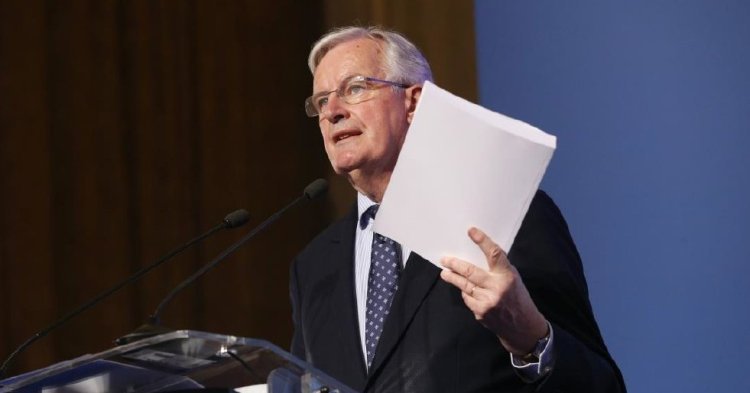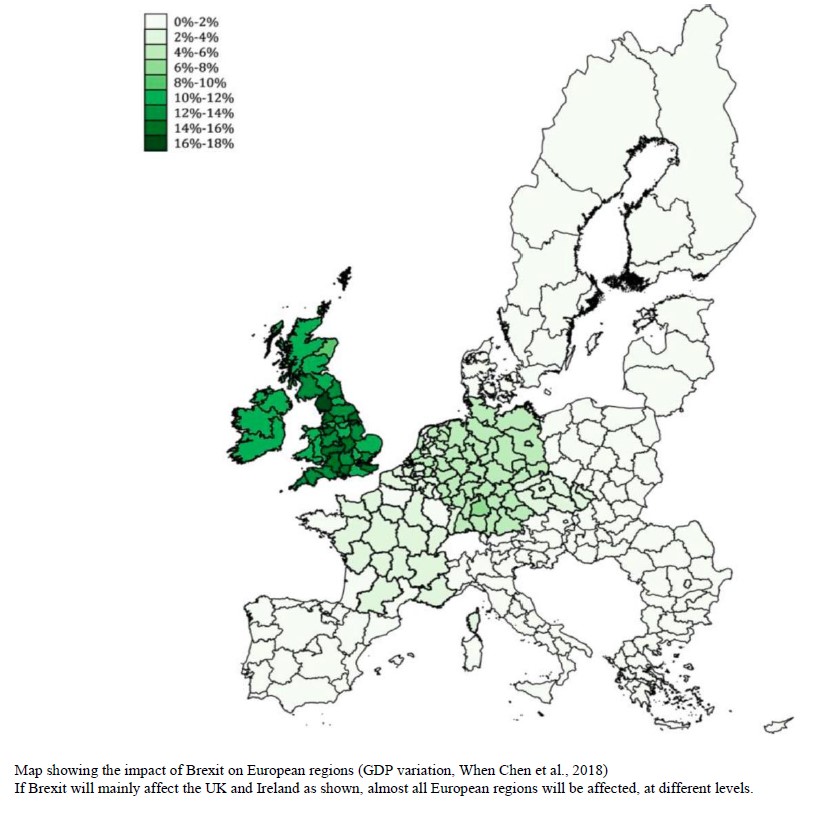“If the UK still wants to leave and wants to do it in an orderly manner, then the withdrawal agreement is the only option”, warned Michel Barnier, the EU’s Chief Brexit negotiator, less than 48 hours after the British Parliament’s second refusal to vote the Withdrawal Agreement.
He kept his promise. Mr Barnier was invited by the European Committee of the Regions (CoR) to speak at their summit. But his presence was as uncertain as the vote in the British Parliament. Every word of his speech, warmly applauded, was carefully chosen while the House of Commons voted for an extension of the Article 50 negotiations. Then, he hurriedly left Bucharest, without time to answer to any journalists’ questions. His speech was reassuring to the regions and cities represented at the summit: “I was one of yours [1]. I have not forgotten any of that”, but he also was very clear when he listed the “innumerable consequences” that a no-deal exit would have on the human, social, economic, and financial levels.
In this scenario, the EU-UK relationship would be ruled by tariffs set by the World Trade Organization, which means tariffs could soar upward to up to 15 percent on meat or tobacco for example, according to the Bank of England. A solution that Mr Barnier is not working towards: “I work to find a deal. The impasse can only be solved in the UK”, he pleaded. He’s particularly worried for the “4.5 million of citizens who are directly affected by Brexit (European citizens living in the United Kingdom and British citizens living in the EU).
A hard Brexit could affect many more people and this situation does not reassure the President of the CoR, Karl-Heinz Lambertz, who wants to alert the regions and the cities on the high risk of an exit without agreement. The CoR supports a future relationship with the UK that allows close cooperation with regions and cities.
“In Ireland, it’s a matter of peace, of stability in this island”
The British regions would undoubtedly be the first to be impacted by an exit without a deal. Although the UK is the EU’s second-biggest economy after Germany, a no-deal exit could bring the British GDP down by 3 to 6 percent. Even if the exports to the EU have fallen in the last 10 years to less than 50%, they still remain crucial for the UK (44% in 2015). In the end, the most exposed regions will be the regions which depend a lot on the European market such as the Midlands and the North of England, many of which voted for Brexit in 2016. In other words, Brexit may exacerbate the inequalities between the regions, which are already very high in the UK.
Outside the United Kingdom, the Republic of Ireland will be the country most directly affected by Brexit. Almost 14% of its exports go directly to the UK and the majority of all its trade crosses the border in one way or another. The question of the border between the Republic of Ireland (EU member) and Northern Ireland (part of the UK) is the most problematic. “As soon as a part of the island leaves the Union, the new border of the single market is now in the middle of the island. We have the duty to protect this single market and to control incoming products, because any product that goes to the Republic of Ireland from the UK, also goes to Poland, Italy and so on”, Michel Barnier warned at the event.
But this question is not only economic, he also added: “In Ireland, it’s a matter of peace, of stability in this island. A lot of effort has been needed to rebuild this peace for 20 years”. Brexit jeopardizes the unity of the United Kingdom also with Scotland which could claim independence after a majority there voted for Remain.
A lose-lose Brexit
The true impact of Brexit will come after 2020 (Brexit gap), because the UK is a “net contributor” to the Union, as Mr Barnier likes to recall. The new annual EU budget (2020-2027) will be reduced by 10 to 12 billion euros per year, a drop of almost 8%. Despite everything, “the British have agreed to pay the divorce bill”, which is a great victory for Michel Barnier. But the 27 could lose funding indirectly if the UK decides to become more restrictive regarding European immigration on its territory. According to the World Bank, every year, French immigrants in England send more than 1.8 billion euros to their home country. Britain is the third-largest country of origin of remittances in the EU (almost $9 billion in 2017). Moreover, almost 8% of the Lithuanian population currently lives in the UK. These questions have to be settled in the exit agreement.
Brexit has “no added value, it’s lose-lose”, said the EU’s chief Brexit negotiator, but some regions and cities could take advantage of it because of the rising tariffs and the weak pound (which mechanically increases the price of imports). According to the Bank of England, the pound, which is seen as a barometre of confidence for foreign investors, could fall from $1.30 to $1.10 after Brexit. Moreover, some cities in continental Europe are looking forward to welcoming the head offices of British companies which want to remain in the Union, or European agencies such as the European Banking Authority (EBA) which is now based in Paris.
For other cities and regions, it will not be so easy: “there will be difficulties for certain regions or for certain sectors, we will do all that we can to support them, including financially”, Mr Barnier said. Every country, every region and every city in Europe has a special relationship with the United Kingdom and will be affected by Brexit differently. Germany exports a large variety of industrial products to England, including 800,000 cars a year (almost 14% of its production).
The Stuttgart region will probably be the most impacted, together with the Western region of Romania, according to the CoR. Other regions and other sectors will also be hit by Brexit: the “made in Italy” textile, which is very famous in Britain, vegetables and foodstuff from the Greek region of Ipeiros, or Brittany in France. In Malta, 40% of loans are from banks located in the UK. Finally, the region of Andalusia in Spain is also very worried about the situation, given the strong economic and social interdependence between the Campo de Gibraltar and the UK.
To conclude, we can quote Karl-Heinz Lambertz, the president of the European Committee of the Regions, who said that “solidarity is better than solitaire”. Meanwhile, Michel Barnier reaffirms that he remains “patient, calm and very respectful of the United Kingdom, of its people and its procedures; because the UK still remains a partner, a friend and an ally”. The withdrawal agreement will not solve everything. Once it is voted on, assuming it can still pass, we have to build a second round of negotiations to organise the future cooperation that we must have with the United Kingdom. “The second negotiation hasn’t started yet”, warned Michel Barnier, who knows that his work here is far from being over.



Follow the comments: |
|
